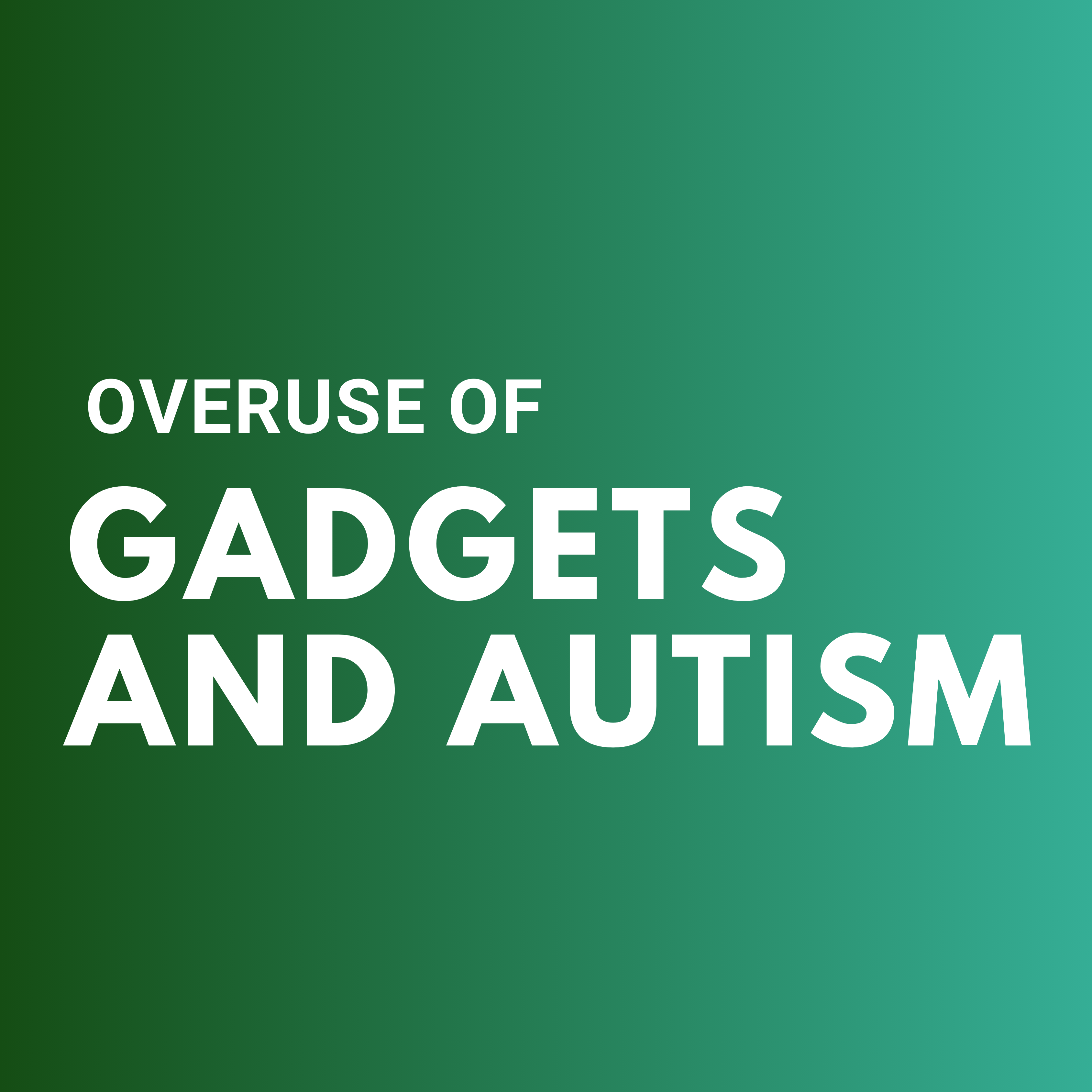The overuse of gadgets, such as smartphones, tablets, and other digital devices, can have both positive and negative consequences on children with autism spectrum disorder (ASD). While these gadgets can provide valuable tools for communication and learning, excessive screen time can have various adverse effects, particularly for children with autism, who may be more sensitive to sensory stimuli and face challenges in social and emotional development, finding the right balance is crucial. Our occupational therapy centre in Bur Juman emphasizes reducing gadget dependence while fostering essential life skills.
Negative Aspects of Gadgets for Children with Autism:
- Over-reliance and Dependency:
- Escaping Real-World Challenges: Children with autism may become overly reliant on gadgets as a coping mechanism, especially if they use them to escape stressful social situations or to avoid other activities like schoolwork or physical exercise.
- Difficulty with Transitions: Children with autism may struggle with transitions, and it can be particularly challenging to get them to stop using a gadget. If they become too attached to screen time, it may result in meltdowns or frustration when it’s time to switch to something else.
- Social Isolation:
- Reduced Face-to-Face Interaction: Excessive gadget use can reduce opportunities for social interaction. For children with autism, socializing and learning social cues is an important skill, and spending too much time with gadgets can hinder their ability to practice these skills in real-life situations.
- Limited Communication Skills: While gadgets can help with communication, they cannot replace the rich, complex communication that happens in person. Children with Autism need to practice verbal and non-verbal communication skills with real people to develop these abilities.
- Sensory Overload:
- Stimulating Environments: Gadgets often provide bright lights, sounds, and moving images, which can overwhelm children with autism who may already be sensitive to sensory stimuli. Prolonged exposure to these stimuli can lead to anxiety, stress, or meltdowns.
- Physical Health Concerns:
- Sedentary Lifestyle: Excessive screen time often leads to a sedentary lifestyle, which can contribute to obesity, poor physical health, and motor skill delays. Physical activity is crucial for all children, especially those with autism who may face additional challenges with motor coordination and physical development.
- Sleep Disruption: The blue light emitted from screens can interfere with melatonin production, making it harder for children to fall asleep. Poor sleep can exacerbate other issues, including irritability, anxiety, and difficulty concentrating.
- Attention Issues:
- Shortened Attention Span: Excessive gadget use, especially with fast-paced games or videos, can contribute to a shorter attention span. Children may find it harder to focus on tasks that require sustained attention, such as schoolwork or conversations.
The Role of Belief Shaping Therapies in Managing Gadget Dependence
At Belief Shaping Therapies, our best occupational therapists in Dubai design personalized programs that reduce gadget reliance while promoting essential life skills. Our occupational therapy centre in Al Hamriya and Umm Hurair offers specialized interventions focusing on sensory integration, social engagement, and physical development.
We address gadget overuse through:
- Customized Therapy Plans tailored to each child’s sensory and social needs.
- Interactive Activities that replace screen time with engaging, hands-on learning.
- Family Guidance to support parents in managing screen time and encouraging alternative activities
Finding Balance
The key is balance. Parents and caregivers can help by setting healthy limits on screen time. Instead of using gadgets just for entertainment, they can encourage their kids to use them for learning or communication, making sure that technology support.
A balanced approach is crucial, with moderation and purposeful use of gadgets to ensure they support, rather than replace, real-world activities. This helps children with autism develop essential skills and thrive.
Recommendations for Managing Gadget Use:
- Set Time Limits:
- Establish clear guidelines for screen time. For younger children, the American Academy of Paediatrics recommends no more than one hour per day of screen time for children aged 2 to 5. For older children, the focus should be on balancing screen time with other activities.
- Supervise and Choose Appropriate Content:
- Carefully select apps, games, and videos that are educational and appropriate for the child’s developmental level. There are many apps tailored specifically for children with autism that focus on communication, social skills, or behavioural management.
- Encourage Active Engagement:
- Engage with the child during screen time to make it more interactive. For example, you can watch videos together, practice communication skills, or discuss the content of a game. This promotes social interaction and can help improve learning outcomes.
- Balance with Other Activities:
- Ensure that gadget use is balanced with other important activities such as outdoor play, physical exercise, social interactions, and creative activities. These activities help children develop motor skills, social skills, and emotional regulation.
- Use Gadgets as a Tool, Not a Replacement:
- Gadgets should be seen as a tool to enhance learning or communication rather than a replacement for face-to-face interaction, play, or physical activity. They should complement real-world experiences, not replace them.
- Establish Routines:
- Many children with autism thrive on routine. Establish a consistent schedule for gadget use and ensure there are clear transitions to other activities to avoid meltdowns or behavioural challenges.
Conclusion
Through personalized interventions and a focus on hands-on, interactive experiences, we empower children to thrive in a gadget-free environment. Our occupational therapists in Dubai are committed to fostering a holistic, nurturing space that supports each child’s unique needs and long-term growth.
The use of gadgets by children with autism requires a thoughtful and balanced approach. At Belief Shaping Therapies, our best occupational therapy centres in Dubai, including Al Hamriya, Umm Hurair, and Bur Juman, offer specialized programs designed to reduce gadget dependence. Our occupational therapy provides a comprehensive approach to addressing the sensory, social, and developmental challenges associated with autism, making it highly effective in promoting healthier, screen-free engagement
By fostering engaging, sensory-friendly, and socially enriching alternatives, Belief Shaping Therapies Dubai helps children transition from screen time to more interactive, hands-on, and fulfilling activities that support their overall development.


